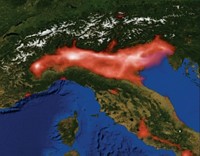Advertisement
Grab your lab coat. Let's get started
Welcome!
Welcome!
Create an account below to get 6 C&EN articles per month, receive newsletters and more - all free.
It seems this is your first time logging in online. Please enter the following information to continue.
As an ACS member you automatically get access to this site. All we need is few more details to create your reading experience.
Not you? Sign in with a different account.
Not you? Sign in with a different account.
ERROR 1
ERROR 1
ERROR 2
ERROR 2
ERROR 2
ERROR 2
ERROR 2
Password and Confirm password must match.
If you have an ACS member number, please enter it here so we can link this account to your membership. (optional)
ERROR 2
ACS values your privacy. By submitting your information, you are gaining access to C&EN and subscribing to our weekly newsletter. We use the information you provide to make your reading experience better, and we will never sell your data to third party members.
Pollution
US states export air pollution’s health effects, study finds
by Cheryl Hogue
February 14, 2020
| A version of this story appeared in
Volume 98, Issue 7

On average, at least 40% of premature deaths due to air pollution in any of the 48 contiguous US states result from emissions originating from other states, a new study finds (Nature 2020, DOI: 10.1038/s41586-020-1983-8). Researchers from the Massachusetts Institute of Technology, Delft University of Technology, and the University of California, Davis, tracked how wind-blown air pollution from each contiguous US state affected health in the other 47 states during 2005, 2011, and 2018. They focused on early deaths due to exposure to ground-level ozone and particulate matter. Led by Steven Barrett, an aeronautics and astronautics professor at MIT, the team found three notable trends. One is that states in the northern Midwest, notably Wyoming and North Dakota, were the largest net exporters of pollution-related premature deaths. Second is that states in the Northeast had the greatest number of deaths from airborne pollution from other states, with New York experiencing the most. The third trend is that West Coast states break even because they have virtually no pollution that blows in from other US states and areas downwind are sparsely populated.





Join the conversation
Contact the reporter
Submit a Letter to the Editor for publication
Engage with us on Twitter